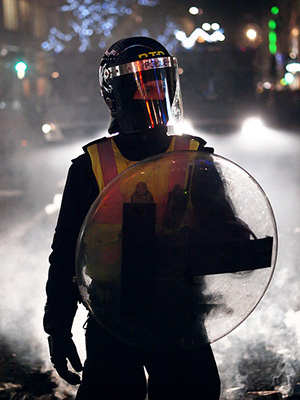 MEDIA ROOTS— As
people in the U.S. and abroad endeavour to exercise their rights and civil
liberties, such as the right to freedom of speech and peaceful assembly, the
state and its police forces continue finding methods to repress such civic activity. An important component of social control and repression of dissent has
been the curtailment of telecommunications.
MEDIA ROOTS— As
people in the U.S. and abroad endeavour to exercise their rights and civil
liberties, such as the right to freedom of speech and peaceful assembly, the
state and its police forces continue finding methods to repress such civic activity. An important component of social control and repression of dissent has
been the curtailment of telecommunications.
Earlier this year, when San Francisco Bay Area Rapid Transit (BART) police killings spurred groups, such as ‘No Justice, No Bart!,’ to call for critical mass demonstrations, BART officials attempted to thwart communication among activists by cutting mobile phone service entirely to transit stations targeted by demonstrators.
Not to be outdone in the U.K., the Metropolitan Police Service of Greater London has been “operating covert surveillance technology that can masquerade as a mobile phone network, transmitting a signal that allows authorities to shut off phones remotely, intercept communications and gather data about thousands of users in a targeted area.”
Messina
***
THE GUARDIAN– The surveillance system has been procured by the Metropolitan police from Leeds-based company Datong plc, which counts the US Secret Service, the Ministry of Defence and regimes in the Middle East among its customers. Strictly classified under government protocol as “Listed X”, it can emit a signal over an area of up to an estimated 10 sq km, forcing hundreds of mobile phones per minute to release their unique IMSI and IMEI identity codes, which can be used to track a person’s movements in real time.
The disclosure has caused concern among lawyers and privacy groups that large numbers of innocent people could be unwittingly implicated in covert intelligence gathering. The Met has refused to confirm whether the system is used in public order situations, such as during large protests or demonstrations.
Nick Pickles, director of privacy and civil liberties campaign group Big Brother Watch, warned the technology could give police the ability to conduct “blanket and indiscriminate” monitoring: “It raises a number of serious civil liberties concerns and clarification is urgently needed on when and where this technology has been deployed, and what data has been gathered,” he said. “Such invasive surveillance must be tightly regulated, authorised at the highest level and only used in the most serious of investigations. It should be absolutely clear that only data directly relating to targets of investigations is monitored or stored,” he said.
The company’s systems, showcased at the DSEi arms fair in east London last month, allow authorities to intercept SMS messages and phone calls by secretly duping mobile phones within range into operating on a false network, where they can be subjected to “intelligent denial of service”. This function is designed to cut off a phone used as a trigger for an explosive device.
A transceiver around the size of a suitcase can be placed in a vehicle or at another static location and operated remotely by officers wirelessly. Datong also offers clandestine portable transceivers with “covered antennae options available”. Datong sells its products to nearly 40 countries around the world, including in Eastern Europe, South America, the Middle East and Asia Pacific. In 2009 it was refused an export licence to ship technology worth £0.8m to an unnamed Asia Pacific country, after the Department for Business, Innovation and Skills judged it could be used to commit human rights abuses.
Read more about Met police using surveillance system to monitor mobile phones.
© 2011 Guardian News and Media Limited
Photo by flickr user Hozinja










